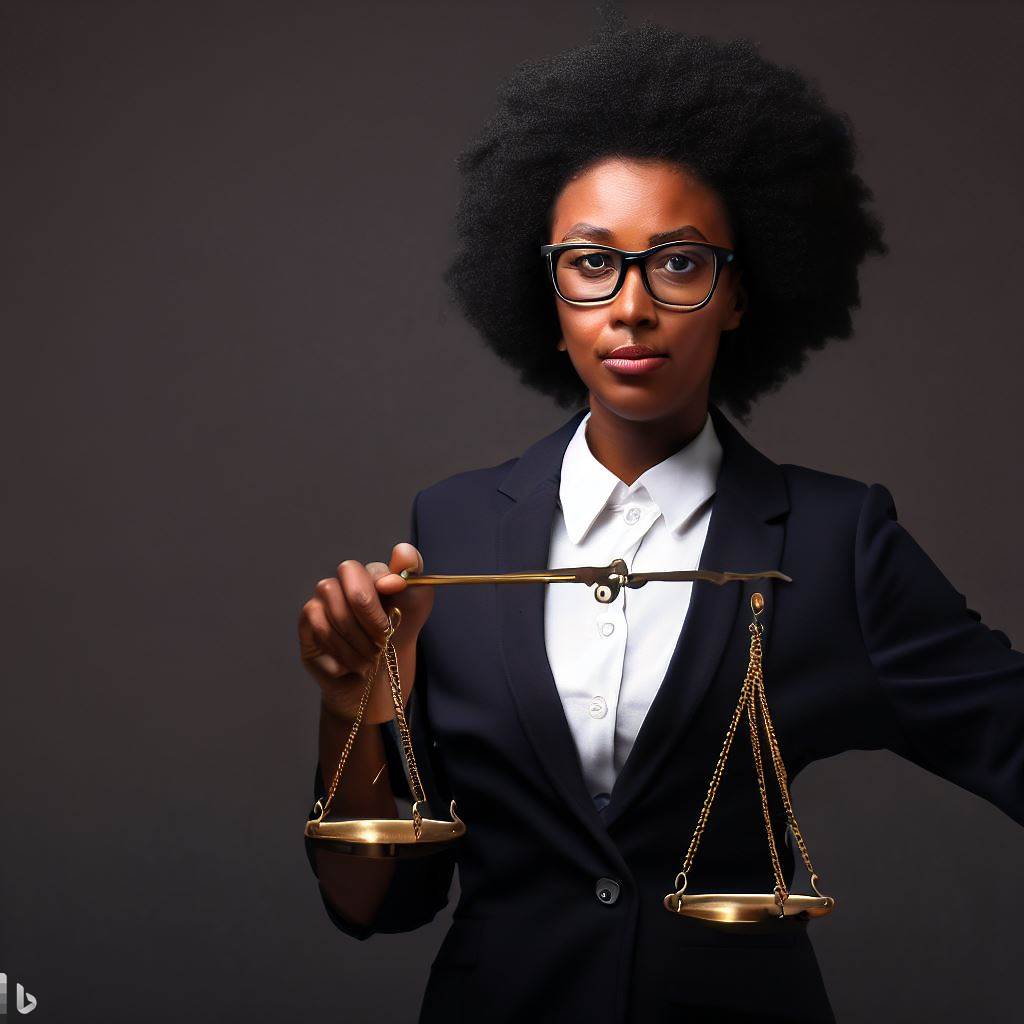Introduction
Gender diversity in the Nigerian attorney profession is a crucial topic that deserves attention. Addressing gender disparities in the legal field is essential for equality and progress.
The legal profession plays a vital role in society, and it is important that it reflects the diversity of the population it serves.
Gender disparities can hinder the profession’s ability to provide fair and inclusive representation for all individuals.
It is important to examine the challenges faced by women in the legal field and work towards creating a more equitable and diverse environment.
By promoting gender diversity, we can enhance the legal profession’s effectiveness and ensure equal opportunities for all practitioners.
Historical Context
Historical background of the Nigerian attorney profession
The Nigerian attorney profession has a rich historical background that can be traced back to the colonial era.
During this time, the legal system in Nigeria was largely influenced by the British common law system.
Before the emergence of Nigerian attorneys, the legal profession was dominated by expatriate British lawyers who were mainly men.
These lawyers had the privilege of practicing law and representing clients in the courts.
Traditional gender roles and expectations that existed within the legal profession
In the early days, patriarchal norms deeply rooted gender roles within the legal profession.
Women faced exclusion from legal education and roles, confined to support positions like secretaries.
Cultural norms discouraged women from pursuing legal careers, seen as male-dominated and assertive.
Women in Nigeria challenged these norms and fought for education and legal career opportunities.
Initiatives emerged, promoting women’s representation in law schools and the legal workforce.
More women entered law, excelled, and took leadership roles in associations.
Despite progress, women are underrepresented in law firms and judiciary leadership.
Biases persist, leading to discrimination, unequal pay, and limited growth. Efforts focus on advocacy, support, and mentoring for gender equality in law.
Nigeria’s legal profession is shifting toward gender diversity, but challenges remain. Inclusion fosters varied perspectives, benefiting both male and female lawyers.
Read: Day in the Life of a Nigerian Attorney: An Insight
Current State of Gender Diversity in the Nigerian Attorney Profession
Gender diversity is a crucial topic in the Nigerian attorney profession, as the representation of women in this field is still a subject of concern.
It is important to explore the current state of gender diversity in the Nigerian attorney profession.
This will help to identify the challenges faced by women attorneys and the initiatives aimed at promoting gender equality.
Representation of Women in the Legal Field in Nigeria
Statistics and data reveal a significant gender disparity in the Nigerian attorney profession.
According to a report by the Nigerian Bar Association, women make up only 32% of practicing attorneys in Nigeria, while men account for the remaining 68%.
These numbers demonstrate a clear underrepresentation of women in the legal field.
Additionally, the report highlights that the representation of women decreases as the hierarchy of the legal profession increases.
Despite comprising nearly half of law graduates, women are significantly underrepresented in senior positions, such as partners in law firms or judges in courts.
This underrepresentation raises concerns regarding gender diversity and equal opportunities for women in the legal field.
Challenges and Barriers Faced by Women Attorneys in Nigeria
Women attorneys in Nigeria face numerous challenges and barriers in their professional journey. One of the main challenges is the traditional gender roles and societal expectations.
Nigerian culture often assigns women the role of caretakers, which can hinder their career advancements in the legal field.
Discrimination and bias against women are prevalent in the profession.
Women attorneys often face gender-based stereotypes, lower salary scales compared to their male counterparts, and a lack of access to leadership positions.
These challenges create an unequal playing field and limit the career growth of women in the attorney profession.
Progress and Initiatives Promoting Gender Diversity
Despite the challenges, significant initiatives aimed at promoting gender diversity in the Nigerian attorney profession have emerged.
The amendment of the Legal Practitioners Act has aimed to enhance the representation of women in the legal profession.
It now mandates that at least one-third of the members of the Body of Benchers, which decides on the admission of lawyers, should be women.
In addition, various organizations and women-led law firms have emerged to empower and promote women attorneys in Nigeria.
These organizations provide mentorship programs, networking opportunities, and training to enhance the skills and opportunities of women in the legal field.
Furthermore, they conduct awareness campaigns and conferences to emphasize the significance of gender diversity in the attorney profession.
These initiatives aim to challenge societal norms, eliminate biases, and create an inclusive environment for women attorneys to thrive.
The current state of gender diversity in the Nigerian attorney profession reveals an underrepresentation of women, particularly in senior positions.
Women attorneys face challenges and barriers, including traditional gender roles, discrimination, and bias.
However, there are promising initiatives and progress being made to promote gender diversity, such as legal reforms and the establishment of support organizations.
It is essential to continue advocating for equal opportunities and create a more inclusive and diverse attorney profession in Nigeria.
Read: The Evolution and History of Legal Professions in Nigeria
Impact of Gender Diversity on the Legal System
Gender diversity in the Nigerian attorney profession plays a significant role in shaping the legal system and its outcomes.
Examining the benefits of a diverse legal profession, we discuss how gender diversity enhances legal services and decision-making.
Additionally, we highlight the significance of fair representation in achieving justice and equality, revealing the profound impact on Nigeria’s legal system.
Benefits of having a diverse legal profession
- A diverse legal profession brings different perspectives, experiences, and insights to the table.
- It allows for a richer and more comprehensive understanding of legal issues and cases.
- Diverse legal teams can better serve a diverse client base and cater to their specific needs.
- Gender diversity fosters innovation, creativity, and adaptability within the legal profession.
- A diverse legal profession promotes inclusivity and equality, challenging discriminatory practices.
How gender diversity can enhance the quality of legal services and decision-making
- Gender diversity brings a wider range of perspectives and approaches to legal problem-solving.
- It helps to minimize bias and prejudice in legal decision-making processes and outcomes.
- When diverse voices are included, there is a higher likelihood of considering all relevant factors.
- Gender diversity fosters a more holistic and well-rounded approach to legal analysis and judgment.
- It ensures that legal services reflect the diverse needs and experiences of all individuals.
Importance of fair representation in achieving justice and equality
- Fair representation ensures that all individuals have equal opportunities to participate in the legal profession.
- It helps to overcome systemic barriers and create a level playing field for aspiring attorneys.
- Gender diversity in the attorney profession promotes trust, legitimacy, and public confidence in the legal system.
- It contributes to a broader understanding and implementation of justice, fairness, and equality in society.
- The legal system can address the unique challenges marginalized groups face by including diverse voices.
Indeed, one cannot underestimate the impact of gender diversity on the Nigerian attorney profession.
It brings numerous benefits, such as a wider array of perspectives, enhanced quality of legal services and decision-making, and a fairer representation of society.
By embracing and promoting gender diversity, the legal system can better achieve justice, equality, and inclusivity for all.
Read: Nigerian Attorneys: Understanding Professional Ethics

Obstacles and Challenges
Gender diversity in the Nigerian attorney profession is still a significant issue in today’s society.
Despite multiple efforts to promote gender equality, the legal profession continues to witness consistent underrepresentation of women.
This blog section aims to spotlight the socio-cultural factors behind the underrepresentation of women attorneys in Nigeria, including biases, discrimination, and stereotypes they encounter.
It will also delve into the challenges they navigate while juggling professional responsibilities with family obligations.
Socio-cultural Factors Contributing to Underrepresentation
Several socio-cultural factors play a role in perpetuating the under-representation of women in the legal profession in Nigeria.
One key factor is the traditional gender roles and expectations imposed by society.
Nigerian culture often associates women with domestic duties and places a higher emphasis on men’s professional careers, making it challenging for women to pursue legal careers actively.
Additionally, cultural stereotypes and biases also hinder women’s progress in the legal profession.
Society tends to view women as less competent than men in legal matters, leading to less support and recognition for women attorneys.
This perception reinforces the underrepresentation of women and prevents them from advancing in their careers.
Biases, Discrimination, and Stereotypes Faced by Women Attorneys
Women attorneys in Nigeria often encounter biases, discrimination, and stereotypes that hinder their professional growth and success.
They face challenges in securing equal employment opportunities, receiving promotions, and accessing leadership positions.
Gender-based discrimination is prevalent in recruitment processes, case assignments, and opportunities for professional development.
Furthermore, women attorneys often face stereotypes that perpetuate gender biases.
Moreover, people often perceive them as less assertive, less competent, and less capable of handling demanding cases.
These stereotypes lead to negative evaluations and limited career advancements for women in the legal profession.
Unique Challenges in Balancing Professional and Family Obligations
Women in the legal profession face additional challenges in balancing their professional responsibilities with family obligations.
The demanding nature of legal careers often requires long working hours, which may conflict with traditional gender roles and expectations.
Furthermore, women are frequently expected to shoulder the primary responsibility for childcare and household duties.
This situation makes it challenging for them to allocate adequate time and energy to their careers.
Moreover, the lack of supportive policies and workplace structures further exacerbates the challenge.
Women attorneys often struggle to find adequate maternity leave, flexible working hours, and childcare provisions.
The absence of such support systems leaves women in a constant juggling act between their professional and family obligations.
Socio-cultural factors, biases, discrimination, and stereotypes that women attorneys face generally hinder gender diversity in the Nigerian attorney profession.
The traditional gender roles and expectations established by society limit women’s active participation. Biases and stereotypes reinforce gender inequalities within the legal profession.
Additionally, women attorneys face unique challenges in balancing their professional and family responsibilities due to demanding work schedules and the lack of supportive policies.
Addressing these obstacles and challenges is crucial to creating a more inclusive and diverse legal profession in Nigeria.
Read: The Role of Attorneys in Nigerian Society Today
Initiatives and Strategies to Promote Gender Diversity
There are various organizations, policies, and programs in Nigeria that are actively working towards promoting gender diversity in the attorney profession.
These initiatives aim to create a more inclusive and equal environment for women attorneys, fostering their career growth and representation.
Organizations, Policies, and Programs
- The Nigerian Women Lawyers Association (NWLA) plays a crucial role in advocating for gender diversity in the legal profession.
They provide support, mentorship, and networking opportunities for women attorneys. - The Legal Practitioners Disciplinary Committee (LPDC) implements policies to ensure equal opportunities for both male and female attorneys.
They prohibit discrimination based on gender in recruitment and promotion processes. - The Women in Law and Development in Africa (WiLDAF Nigeria) is an organization that empowers women lawyers through training, capacity building, and access to legal resources.
- The International Federation of Women Lawyers (FIDA Nigeria) works to eliminate gender discrimination in the legal profession and society.
They provide legal aid and representation for women facing gender-based challenges. - The National Association of Women Judges of Nigeria (NAWJN) actively promotes gender diversity in the judiciary.
They organize conferences, workshops, and trainings to enhance the professional skills of women judges.
Mentorship, Networking, and Leadership Development
Mentorship, networking, and leadership development programs play a significant role in supporting women attorneys and helping them overcome the challenges they face in their careers.
These programs connect women attorneys with experienced mentors who provide guidance, support, and advice.
These mentors may share their own experiences and provide valuable insights into navigating the legal profession.
Networking events and platforms facilitate connections with other professionals in the legal field.
It will enable women attorneys to expand their professional circles, create collaborations, and access new opportunities.
Publish Your Professional Profile, Business or Brand
Showcase your expertise, gain trust, and boost visibility instantly on Professions.ng.
Publish NowLeadership development programs aim to equip women attorneys with the necessary skills and knowledge.
This enables them to assume leadership roles in the legal profession.
These programs provide training on assertiveness, negotiation, and strategic decision-making.
Successful Stories and Advancements
Several successful stories and advancements have emerged, contributing to the improvement of gender representation in the Nigerian attorney profession.
One notable success is the appointment of more women judges to higher courts.
This increase in gender diversity on the bench contributes to a more balanced and fair judicial system.
Another achievement is the rise of women-led law firms in Nigeria. These firms are breaking barriers and providing platforms for women to lead and excel in the legal profession.
Furthermore, the inclusion of gender diversity in corporate policies and guidelines has contributed to positive change.
Many law firms and organizations now prioritize gender equality and inclusivity in their recruitment and promotion processes.
Additionally, the recognition and celebration of accomplished women attorneys through awards and recognition programs serve to inspire and motivate other women in the profession.
Basically, various organizations, policies, and programs in Nigeria are actively promoting gender diversity in the attorney professio
By offering mentorship, networking, and leadership development, the legal profession is providing support to women attorneys in their careers.
Moreover, successful stories and advancements vividly demonstrate the positive impact of these initiatives in enhancing gender representation in the Nigerian legal profession.
Read: Path to Becoming an Attorney in Nigeria: A Guide
Conclusion
This blog post has highlighted the importance of gender diversity in the Nigerian attorney profession.
It is evident that there is a significant gender imbalance in this field, with women being underrepresented.
We have discussed the barriers that prevent gender diversity, such as cultural norms and biases, lack of mentorship opportunities, and limited access to resources.
These factors have contributed to the underrepresentation of women in the legal profession in Nigeria.
We should continue and intensify efforts to promote gender diversity.
Moreover, addressing the root causes of gender imbalance and implementing initiatives that promote equal opportunities for women in the attorney profession is crucial.
Additionally, we encourage readers to actively support initiatives that work towards breaking down barriers and promoting gender equality in the legal field.
Furthermore, this could encompass advocating for stronger policies and regulations that promote gender diversity.
Including supporting mentorship programs for women lawyers, and creating a supportive environment for women professionals.
Gender diversity in the Nigerian attorney profession is not only a matter of fairness.
It also contributes to better decision-making, improved access to justice, and a more inclusive legal system.
By supporting initiatives that promote gender equality, we can create a more just and equitable legal profession in Nigeria.




